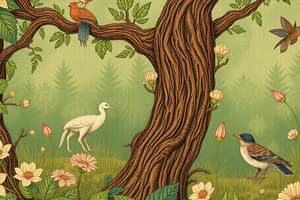Podcast
Questions and Answers
Which biome is known to be the driest?
Which biome is known to be the driest?
- Desert (correct)
- Tundra
- Savanna
- Rain forest
What is the term for millipedes, centipedes, insects, slugs, and earthworms found under a log?
What is the term for millipedes, centipedes, insects, slugs, and earthworms found under a log?
- Abiotic factors
- Predator-prey relationship
- Limiting factors
- Biological community (correct)
What is the part of the marine biome called that receives sufficient sunlight for photosynthesis?
What is the part of the marine biome called that receives sufficient sunlight for photosynthesis?
- Benthic zone
- Aphotic zone
- Photic zone (correct)
- Littoral zone
Which relationship is described by a tick feeding on a cat?
Which relationship is described by a tick feeding on a cat?
Which factors can prevent tree growth in mountain areas?
Which factors can prevent tree growth in mountain areas?
What term is used to describe the first organisms to grow on new volcanic islands?
What term is used to describe the first organisms to grow on new volcanic islands?
Which kinds of plants begin to grow in a field after a corn crop is harvested?
Which kinds of plants begin to grow in a field after a corn crop is harvested?
Which biome is known for having a large diversity of life?
Which biome is known for having a large diversity of life?
Flashcards are hidden until you start studying
Study Notes
Ecological Concepts
- Abiotic factor: A non-living component of an ecosystem, such as rain.
- Biological community: A group of different species interacting with each other in a specific area, such as an owl eating a mouse.
- Habitat: The environment in which an organism lives, including living and non-living factors.
- Parasitism: A relationship where one organism benefits and the other is harmed, such as a tick on a cat.
- Predator-prey relationship: An interaction where one species hunts and feeds on another, such as an owl eating a mouse.
- Limiting factors: Environmental factors that restrict the growth or survival of an organism, such as cold temperatures and high winds that prevent tree growth in mountain areas.
Succession
- Secondary succession: The process of ecosystem recovery in an area where a community has been disturbed, such as weeds and wildflowers growing in a field after a corn crop is harvested.
- Pioneer species: The first organisms to colonize a new or disturbed area, such as the first organisms to grow on a new patch of cooled, hardened lava.
- Climax community: A stable and mature ecosystem that has reached its final stage of development, such as an old forest that has not had any fire damage in over 200 years.
Biomes
- Rain forest: A biome with the highest biodiversity, characterized by high temperatures and high rainfall.
- Tundra: A cold and treeless biome with limited life forms.
- Desert: The driest biome, characterized by low rainfall and high temperatures.
- Photic zone: The shallow part of the marine biome where sunlight can penetrate, supporting photosynthesis.
- Plankton: The base of the marine biome food chain, consisting of small, floating organisms.
Competition and Adaptation
- Intra-specific competition: Competition between individuals of the same species for resources.
- Inter-specific competition: Competition between individuals of different species for resources.
- Savanna biome: Characterized by grasslands with scattered trees, and common animal species such as lions, elephants, and giraffes.
- Human impact on savannas: Habitat destruction, overgrazing, and fragmentation, which can be addressed through conservation efforts and sustainable land use.
- Adaptive mechanisms in desert animals: Specialized physical features, such as camels' humps, and behaviors, such as nocturnal activity, to cope with extreme temperatures and limited water.
Tropical Forests in Ethiopia
- Yes, Ethiopia has tropical forests, which are located in certain regions, including the southwestern part of the country.
Studying That Suits You
Use AI to generate personalized quizzes and flashcards to suit your learning preferences.



